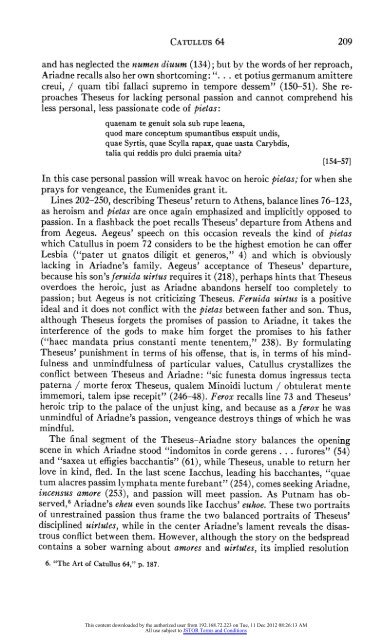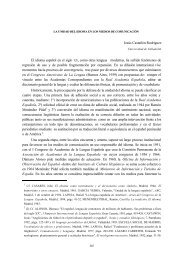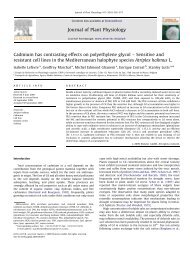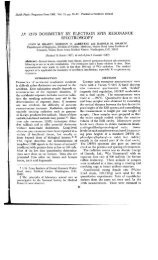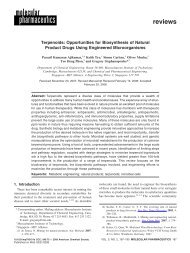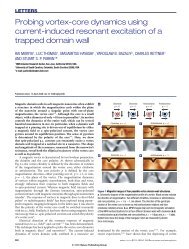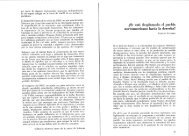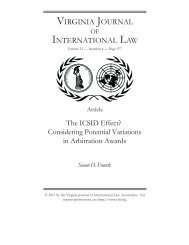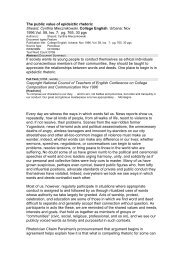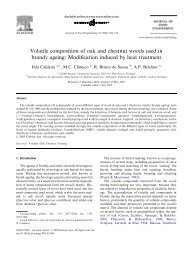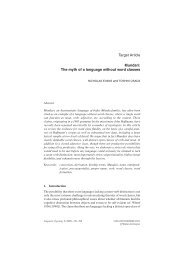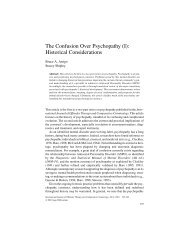Catullus 64 and the Conflict between A mores and Virtutes
Catullus 64 and the Conflict between A mores and Virtutes
Catullus 64 and the Conflict between A mores and Virtutes
You also want an ePaper? Increase the reach of your titles
YUMPU automatically turns print PDFs into web optimized ePapers that Google loves.
CATULLUS <strong>64</strong> 209<br />
<strong>and</strong> has neglected <strong>the</strong> numen diuum (134); but bv <strong>the</strong> words of her reproach,<br />
Ariadne recalls also her own shortcoming: ". . . et potius germanum amittere<br />
creui, / quam tibi fallaci supremo in tempore dessem" (150-51). She re-<br />
proaches Theseus for lacking personal passion <strong>and</strong> cannot comprehend his<br />
less personal, less passionate code of pietas:<br />
quaenam te genuit sola sub rupe leaena,<br />
quod mare conceptum spumantibus exspuit undis,<br />
quae Syrtis, quae Scylla rapax, quae uasta Carybdis,<br />
talia qui reddis pro dulci praemia uita?<br />
[154-571<br />
In this case personal passion will wreak havoc on heroic pietas; for when she<br />
prays for vengeance, <strong>the</strong> Eumenides grant it.<br />
Lines 202-250, describing Theseus' return to A<strong>the</strong>ns, balance lines 76-123,<br />
as heroism <strong>and</strong> pietas are once again emphasized <strong>and</strong> implicitlv opposed to<br />
passion. In a flashback <strong>the</strong> poet recalls Theseus' departure from A<strong>the</strong>ns <strong>and</strong><br />
from Aegeus. Aegeus' speech on this occasion reveals <strong>the</strong> kind of pietas<br />
which <strong>Catullus</strong> in poem 72 considers to be <strong>the</strong> highest emotion he can offer<br />
Lesbia ("pater ut gnatos diligit et generos," 4) <strong>and</strong> which is obviously<br />
lacking in Ariadne's family. Aegeus' acceptance of Theseus' departure,<br />
because his son's feruida uirtus requires it (218), perhaps hints that Theseus<br />
overdoes <strong>the</strong> heroic, just as Ariadne ab<strong>and</strong>ons herself too completely to<br />
passion; but Aegeus is not criticizing Theseus. Feruida uirtus is a positive<br />
ideal <strong>and</strong> it does not conflict with <strong>the</strong> pietas <strong>between</strong> fa<strong>the</strong>r <strong>and</strong> son. Thus,<br />
although Theseus forgets <strong>the</strong> promises of passion to Ariadne, it takes <strong>the</strong><br />
interference of <strong>the</strong> gods to make him forget <strong>the</strong> promises to his fa<strong>the</strong>r<br />
("haec m<strong>and</strong>ata prius constanti mente tenentem," 238). By formulating<br />
Theseus' punishment in terms of his offense, that is, in terms of his mind-<br />
fulness <strong>and</strong> unmindfulness of particular values, <strong>Catullus</strong> crystallizes <strong>the</strong><br />
conflict <strong>between</strong> Theseus <strong>and</strong> Ariadne: "sic funesta domus ingressus tecta<br />
paterna / morte ferox Theseus, qualem Minoidi luctum / obtulerat mente<br />
immemori, talem ipse recepit" (246-48). Ferox recalls line 73 <strong>and</strong> Theseus'<br />
heroic trip to <strong>the</strong> palace of <strong>the</strong> unjust king, <strong>and</strong> because as a ferox he was<br />
unmindful of Ariadne's passion, vengeance destroys things of which he was<br />
mindful.<br />
The final segment of <strong>the</strong> Theseus-Ariadne story balances <strong>the</strong> opening<br />
scene in which Ariadne stood "indomitos in corde gerens . . . furores" (54)<br />
<strong>and</strong> "saxea ut effigies bacchantis" (61), while Theseus, unable to return her<br />
love in kind, fled. In <strong>the</strong> last scene Iacchus, leading his bacchantes, "quae<br />
tum alacres passim lVmphata mente furebant" (254), comes seeking Ariadne,<br />
incensus amore (253), <strong>and</strong> passion will meet passion. As Putnam has ob-<br />
served,6 Ariadne's eheu even sounds like Iacchus' eu/ioe. These two portraits<br />
of unrestrained passion thus frame <strong>the</strong> two balanced portraits of Theseus'<br />
disciplined uirtutes, while in <strong>the</strong> center Ariadne's lament reveals <strong>the</strong> disas-<br />
trous conflict <strong>between</strong> <strong>the</strong>m. However, although <strong>the</strong> story on <strong>the</strong> bedspread<br />
contains a sober warning about a<strong>mores</strong> <strong>and</strong> uirtutes, its implied resolution<br />
6. "The Art of <strong>Catullus</strong> <strong>64</strong>," p. 187.<br />
This content downloaded by <strong>the</strong> authorized user from 192.168.72.223 on Tue, 11 Dec 2012 08:26:13 AM<br />
All use subject to JSTOR Terms <strong>and</strong> Conditions


